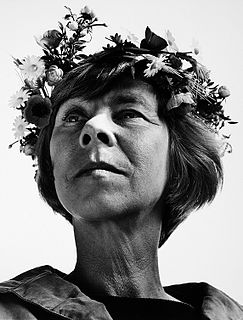A Quote by Friedrich Nietzsche
In his lonely solitude, the solitary man feeds upon himself; in the thronging multitude, the many feed upon him. Now choose.
Related Quotes
Solitude is the profoundest fact of the human condition. Man is the only being who knows he is alone, and the only one who seeks out another. His nature - if that word can be used in reference to man, who has ‘invented’ himself by saying ‘no’ to nature - consists in his longing to realize himself in another. Man is nostalgia and a search for communion. Therefore, when he is aware of himself he is aware of his lack of another, that is, of his solitude.
Every book is an image of solitude. It is a tangible object that one can pick up, put down, open, and close, and its words represent many months if not many years, of one man’s solitude, so that with each word one reads in a book one might say to himself that he is confronting a particle of that solitude
Anyway, solitary people interest me. There are so many different ways of being solitary.' 'I know just what you mean,' said X. 'I know exactly what you're going to say. Different kinds of solitude. Enforced solitude and voluntary solitude.' 'Quite,' said Viktoria. 'There's no need to go into it further. But when people understand one another without speaking, it can often leave them with very little to talk about, don't you think?
Let a man choose what condition he will, and let him accumulate around him all the goods and gratifications seemingly calculated to make him happy in it; if that man is left at any time without occupation or amusement, and reflects on what he is, the meagre, languid felicity of his present lot will not bear him up. He will turn necessarily to gloomy anticipations of the future; and unless his occupation calls him out of himself, he is inevitably wretched.
Is it not a thing most abominable, that God who feeds so many mouths, should be held in such low esteem by me, that I will not trust him to feed me? Yea, that a guilder, thirty-eight cents, should be valued more highly than God, who pours out his treasures everywhere in rich profusion. For the world is full of God and his works. He is everywhere present with his gifts, and yet we will not trust in him, nor accept his visitation.
The observations and encounters of a solitary, taciturn man are vaguer and at the same times more intense than those of a sociable man; his thoughts are deeper, odder and never without a touch of sadness. Images and perceptions that could be dismissed with a glance, a laugh, an exchange of opinions, occupy him unduly, become more intense in the silence, become significant, become an experience, an adventure, an emotion. Solitude produces originality, bold and astonishing beauty, poetry. But solitude also produces perverseness, the disproportionate, the absurd and the forbidden.
No man could bring himself to reveal his true character, and, above all, his true limitations as a citizen and a Christian, his true meannesses, his true imbecilities, to his friends, or even to his wife. Honest autobiography is therefore a contradiction in terms: the moment a man considers himself, even in petto, he tries to gild and fresco himself. Thus a man's wife, however realistic her view of him, always flatters him in the end, for the worst she sees in him is appreciably better, by the time she sees it, than what is actually there.






































